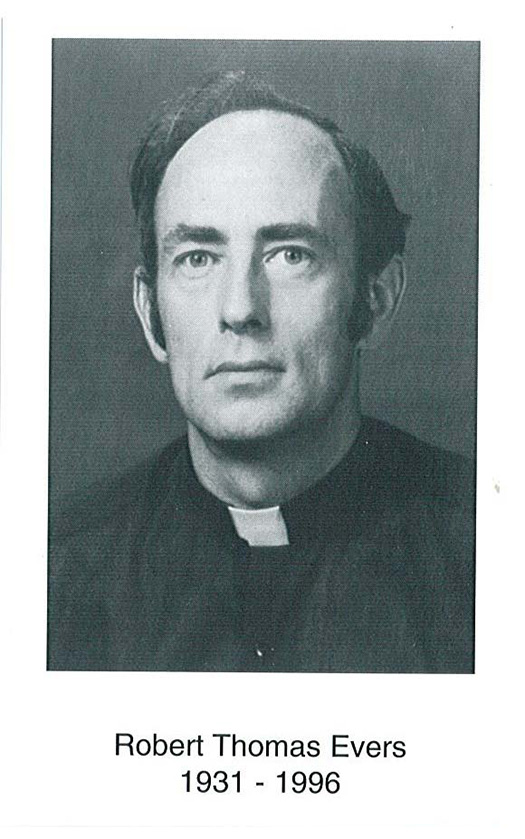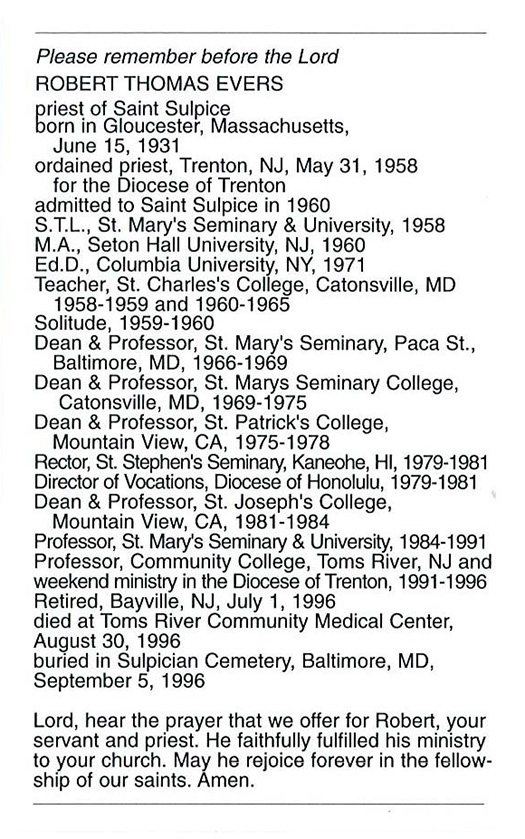Evers, Father Robert Thomas, S.S.
1996, August 30
Date of Birth: 1931, June 15
December 2, 1996
The death of our colleague, Robert Thomas Evers, on August 30, 1996, is a strong lesson of the Lord’s teaching as another church year nears its end. “You know not the day or the hour.” Get ready, be ready, stay ready, be prepared every moment of every day. While Father Evers’ last years were probably among his most contented, he eagerly anticipated the first day of his retirement, July 1, this year. There was no indication of a fatal illness, but only two months of retirement checks reached him. A funeral Mass was celebrated the day the third social security check arrived, which was returned to the government.
Though reducing some teaching hours and ministry commitments for this fall, the lifestyle of Father Evers did not include some years of idleness. In due time he planned a move to St. Charles Villa to join other retired Sulpicians, but until then he would enjoy the small shore home he had shared and inherited from his mother and his uncle, Joseph Kearney, whom he had regarded as a foster father since the mid‑1940s.
Born in Gloucester, Massachusetts, on June 15, 1931, the first of three sons of Clifford and Agnes Kearney Evers, Robert was living with his family in Millburn, New Jersey, by the time he entered the public school system and there he completed high school. He had taken an active part in both the religious education and youth ministry programs of the parish church. He began college in Indiana at the University of Notre Dame intending to major in chemistry. An interest in priesthood grew while he was there, however, which led him to transfer to New Jersey’s Seton Hall College to concentrate on classical languages for two years.
Robert’s formal training for the priesthood began in Baltimore in 1952 at St. Mary’s Seminary, where he received his bachelor’s degree in philosophy. In 1958, he completed his seminary studies in theology at the Roland Park campus and was awarded the licentiate in theology. Then on May 31, Bishop George Ahr of Trenton ordained him a priest, having graciously released him the previous year for seminary teaching with the Society of Saint Sulpice.
Father Evers taught a variety of high school courses, including science and speech, at St. Charles College in Catonsville his first year as a priest and again from 1960 to 1965. His second year had been occupied in the year of Sulpician formation, where the director, the Reverend James A. Laubacher, S.S., long‑time rector of St. Mary’s School of Theology, observed that the young priest’s “bent of mind is more toward the practical than the speculative.” That was clearly evident also in Father Evers’ summer studies from 1957 to 1960 at Seton Hall, which awarded him the M.A. in education. His keen interest in methods and the organization of educational programs was life‑long from this period, although by 1965 his primary focus had shifted to speech, including theory of oral communication and speech pathology, clearly very practical needs in the training of preachers. In the summer of 1962, he attended a workshop at Seton Hall on teaching religion to the deaf. A more significant influence on him occurred during the following Christmas holidays at a meeting of the Catholic Homiletic Society in Cleveland at the same hotel where the annual convention of the Speech Association of America was taking place. He was particularly impressed with a presentation on a speech improvement program by a Benedictine monk from St. Meinrad’s Abbey, including laboratories and speech therapy available to all entering seminarians. The Sulpician provincial superior, reading Father Evers’ report, encouraged him to pursue his interest in this program.
With that encouragement, Father Evers enrolled in a doctoral program at Teachers College, Columbia University in New York. The head of the speech department, in response, recommended that the doctorate in education as more practical for seminary education than the technical offerings of the Ph.D. program. A full‑time student at Columbia from June 1965, to August 1966, he did not complete his doctorate until 1971. An important bonus for the Sulpicians during that period was his friendship with a fellow scholar from Pakistan who was majoring in educational psychology. That was Anthony Lobo, who, after earning his Ph.D., entered St. Mary’s Seminary, became a priest and a Sulpician.
Father Evers returned to Baltimore in the fall of 1966 to take up administration and speech and education courses at the Paca Street campus. A newly appointed rector, who had been the academic dean for five years, found Father Evers arrival most fortuitous. Their partnership helped the faculty to make a dramatic but smooth transition from the age‑old pattern of priestly formation to the new guidelines set forth by the recently completed Second Vatican Council. Both priests took an active role in the related work of the seminary department of the National Catholic Educational Association and also participated in other professional groups.
In 1969, Father Evers was appointed a member of the initial American bishops’ steering committee for priestly formation which was to do the groundwork for the innovative Bishops’ Program of Priestly Formation in the United States. He also served a term as president of the Maryland Association for Higher Education, an unusual forum for a seminary professor. Another group, the American Speech and Hearing Association, awarded Robert its certificate of clinical competence in speech pathology.
Father Evers’ teaching skills in the field of educational theory, history, and methods, as well as in effective speech, reflected a mastery of course structure, the development of syllabi, and scheduling, for which he showed remarkable patience and attention to detail. Although he much preferred teaching to administration, he spent more of his Sulpician career in the latter area, which included accreditation visits to other campuses as well as drafting accreditation reports in Sulpician seminaries. Appointed dean of studies at St. Joseph’s College in Mountain View, California, from, 1975 to 1978 and again 1981 to 1984, he spent the interim years at St. Stephen’s Seminary in Kaneohe, Hawaii, including two years as rector, and part time as lecturer in speech at Chaminade College where the seminarians took their classes. At Chaminade he strengthened the relationship between the Seminary and the College as a member of the campus ministry team, while also administering the permanent deacon program and serving as vocation director for the Diocese of Honolulu. St. Stephen’s, however, closed in 1981 because of low enrollment.
Through much of his life, Father Evers lived near the sea and that surely encouraged his love of the outdoors and boating, which he shared as much as possible with a devoted dog. While at St. Charles College he owned a small camping trailer until it was destroyed in a garage fire. A deeper commitment was to the U.S. Coast Guard Auxiliary where he was an operational member and an instructor in boat piloting and weather. He also belonged to the U. S. Power Squadron, and at the time of his death still owned a boat at his home in Bayville, though he had little opportunity to sail in his last years.
It is a well-known fact that a fair number of priests have found their dogs good company for inevitable periods of loneliness. A good bit of Father Evers’ ministry was lonely work even while living in a faculty community. For much of his adult life he coped with high blood pressure and a genetic kidney disease, and there were periods of depression. Still he found much satisfaction in doing weekend parish ministry wherever he was stationed from his earliest days as a priest and during the summers at St. Barnabas church near his New Jersey home.
In 1984, Father Evers accepted an appointment at St. Mary’s Seminary in Baltimore, which involved a re‑working of the homiletics program as well as the spiritual direction of students. Taking a medical leave in 1989, he moved to his home in Bayville and supported himself with teaching speech at Ocean County Community College which had very positive results. He also provided weekend assistance at St. Barnabas and St. Justin churches and as needed during the week, which also provided companionship and generous hospitality. Occasionally he also assisted the Coast Guard Auxiliary.
During those years at his home his health improved, and the massive stroke he suffered on July 31 was completely unexpected. In the early part of August, Father Melvin Blanchette, S.S., director of Sulpician personnel services, had visited Father Evers, and saw some improvement as the result of therapy. A fall, however, led to the onset of pneumonia. Father Blanchette was again at the hospital, along with Father Gerald Brown, S.S., Provincial Superior, to be with his brothers as Father Evers prepared for death which occurred the following day.
A funeral liturgy at St. Barnabas, with Bishop John C. Reiss of Trenton presiding and Father Brown preaching, brought a large outpouring of parish praise for Father Evers’ preaching and compassionate ministry. A Mass of Christian burial was celebrated in St. Mary’s Seminary chapel on September 5 in the presence of the community and his family, with Auxiliary Bishop William C. Newman presiding. The Reverend William J. Lee, S.S., delivered the homily. Father Brown, in his remarks at the funeral, mentioned the intensity of Father Evers’ pain and the sense of peace that pervaded the hospital room in the last hours before his death on August 30. A graveside service at the Sulpician cemetery in Catonsville was led by the Very Reverend Lawrence B. Terrien, S.S., Superior General of Saint Sulpice. Father Evers is survived by his two brothers, Clifford and James, and their families.
William J. Lee, S.S.
Provincial Secretary


